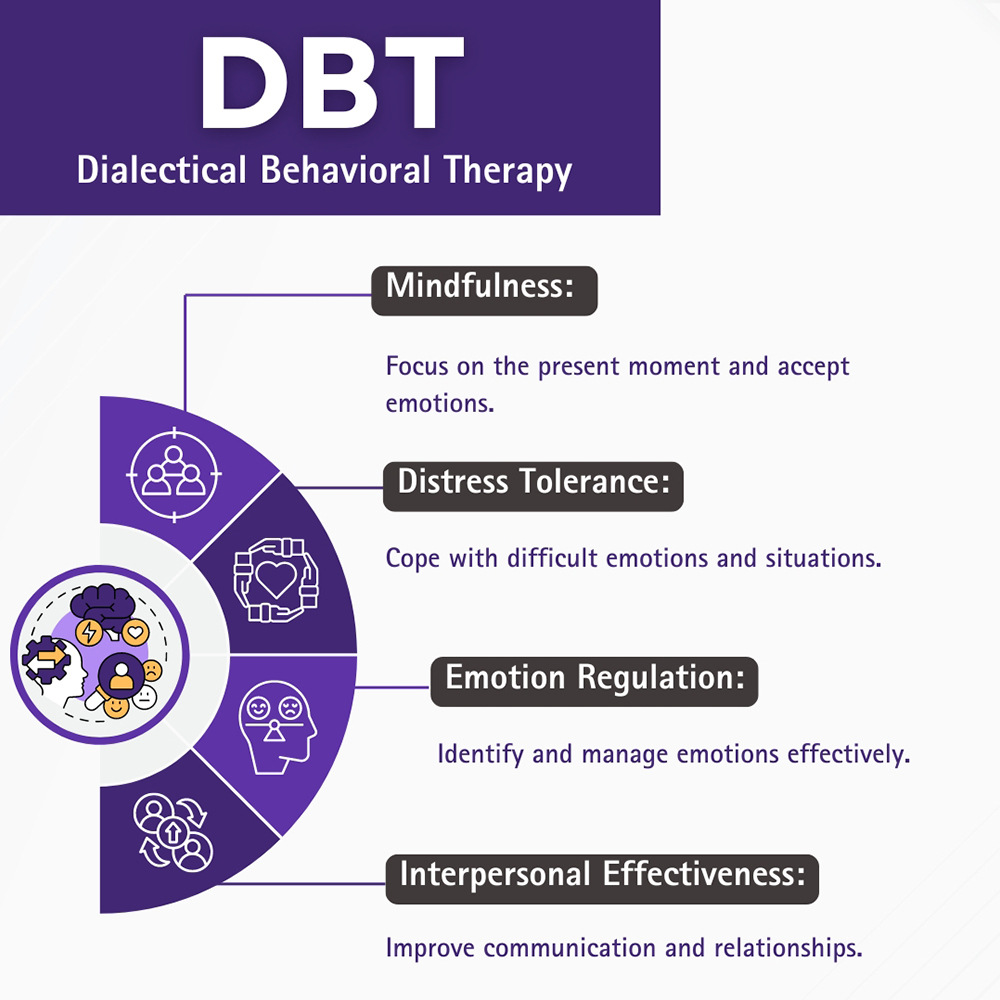Understanding Dialectical Behavioral Therapy
Definition and History
Dialectical behavioral therapy (DBT) is a skills-based therapy that teaches individuals distress tolerance, interpersonal effectiveness, and emotional regulation. Dialectical means accepting and finding the balance between seemingly opposing ideas. Dialectical thinking helps us understand complex ideas.
Dr. Marsha Linehan originally developed DBT as a type of cognitive behavioral therapy (CBT) to help individuals with borderline personality disorder (BPD) deal with intense emotions and self-harm. Dr. Linehan added the principles of mindfulness and acceptance to CBT principles to create a therapy better suited to individuals dealing with symptoms of BPD.
In later years, psychologists found that DBT is also effective for co-occurring disorders such as substance use, depression, anxiety, and eating disorders.
Core Assumptions of DBT
The core assumptions of DBT help therapists and individuals work together to create a safe space where lasting change can be achieved.
The core assumptions of DBT include:
- Change and acceptance are integral parts of life.
- We benefit when our actions are purposeful and serve a function.
- All individuals are whole and worthy.
- All experiences are valid, and everyone is capable of change.

If you want to learn more about DBT, contact us today for a free consultation with a DBT therapist and learn about how DBT skills can help change your life.
For more information about our counselors or to schedule an appointment with a DBT therapist, contact us now.
(561) 363-7994DBT Skills Training

Six Main Points of Dialectical Behavior Therapy
The six main points of dialectical behavioral therapy include:
- Acceptance: DBT teaches us to accept things the way they are if we cannot change them.
- Mindfulness: DBT teaches us to be aware of our thoughts, feelings, and body to help us remain in the present moment.
- Dialectical thinking: DBT shows us that there are often two sides to many situations that help us live a more balanced life.
- Distress tolerance: DBT helps us handle difficult emotions and situations in a healthy way.
- Emotional regulation: Emotional regulation helps us manage, experience, and let go of emotions.
- Interpersonal effectiveness: DBT teaches how to have healthy relationships by utilizing clear communication, maintaining assertiveness, and setting boundaries.
DBT skills can be incredibly helpful for everyone trying to lead a healthier lifestyle, grow, and improve themselves.
Benefits of Skills Training
DBT skills can empower you to cope with life’s challenges confidently. Throughout DBT, you will develop healthy coping mechanisms to build a life of stability, fulfillment, and meaningful connections. You may notice yourself engaging in fewer impulsive behaviors, having fewer mood swings, and enjoying more stability in your relationships.
Life will never be without its challenges. However, with DBT, you will learn to tolerate distress and navigate future challenges with grace.
What Does Dialectical Behavior Therapy Not Emphasize?
DBT does not focus on the following:
- Medication: Since DBT is a skills-based therapy, it does not focus on medications. However, it can be used in combination with medication.
- Diagnosis: While a diagnosis can be helpful, DBT focuses on teaching skills applicable to a wide range of challenges.
- The past: DBT focuses on developing skills for the present moment, but therapists may explore past experiences relevant to current struggles.
Our West Palm therapists are experienced in providing DBT skilled-based therapy to clients in order to help manage emotions and behaviors. With DBT, you can learn to regain control of your emotions and improve your relationships.
DBT Treatment Structure
DBT can be structured in two ways including:
- Individual therapy: Allowing personalized attention to your specific needs.
- Group therapy: A supportive environment in which to learn from others and practice skills.
DBT helps individuals regulate their emotions, tolerate distress, and improve their interpersonal effectiveness.
What Is Dialectical Behavior Therapy Used For?
DBT is typically used for treating borderline personality disorder; however, DBT skills can be beneficial for a variety of issues and mental health disorders, such as:
- Depression
- Anxiety
- Emotional dysregulation
- Difficulty with relationships, such as trauma bonding
- Narcissistic personality disorder (NPD)
- Somatic symptom disorder (SSD)
- Difficulty with relationships
- Seasonal affective disorder (SSD)
DBT teaches practical skills that can be used in day-to-day situations to help improve the quality of life.
Effectiveness of Dialectical Behavior Therapy
Research has shown DBT to be effective for a variety of mental health conditions. According to an article published in the Journal of Consulting and Clinical Psychology, “DBT was more effective than other treatments, such as cognitive behavioral therapy (CBT), for reducing depression symptoms.”
Another study published in the Clinical Psychology Review showed that “DBT was more effective than other treatments for reducing BPD symptoms.”
Getting Help with DBT
How Do I Find a DBT Therapist?
To find a DBT therapist, check the therapist’s credentials. Look for a therapist trained and experienced in dialectical behavioral therapy (DBT). Therapists may be certified by the DBT Linehan Board of Certification or have received training from other reputable organizations.
What to Expect in DBT
During your sessions, your therapist will explain DBT concepts and skills to you. Together, you can practice each skill in session and discuss potential benefits, as well as plan for difficulties that may arise while practicing these skills in your daily life.
To get the most out of DBT, your therapist will expect you to commit to learning and practicing skills outside of sessions.
What Are the Benefits and Risks of Dialectical Behavior Therapy (DBT)?
There are minimal risks of DBT; however, some challenges of DBT include:
- Some clients may be unwilling to try the many DBT skills
- Homework may be unsuitable for some clients
- Regular sessions are necessary
The benefits of DBT outweigh the risks and include treating:
- Borderline personality disorder (BPD)
- Depression
- Anxiety
- Eating disorders
- Post-traumatic stress disorder (PTSD)
- Substance use disorders
DBT Online Therapy or Virtual Consultations
Does Insurance Cover Dialectical Behavior Therapy?
DBT is covered by insurance. You can call your insurance company and ask if they cover DBT therapy or provide a specific therapist or company name. You can also call your therapist and ask if they accept your insurance. At the Trauma Therapy Center, we do not directly bill your insurance; however, we can help provide you with a superbill to seek reimbursement from your insurance company.
Dialectical behavior therapy (DBT) is a highly effective treatment for a wide range of mental health conditions. At the Trauma Therapy Center in West Palm Beach, we have experienced DBT therapists who can help you learn the skills you need to manage your emotions, tolerate distress, and improve interpersonal effectiveness. Contact us today to schedule a session and learn more about how DBT in West Palm Beach can help you.

